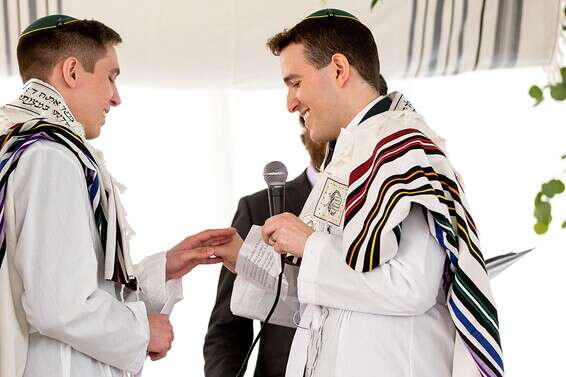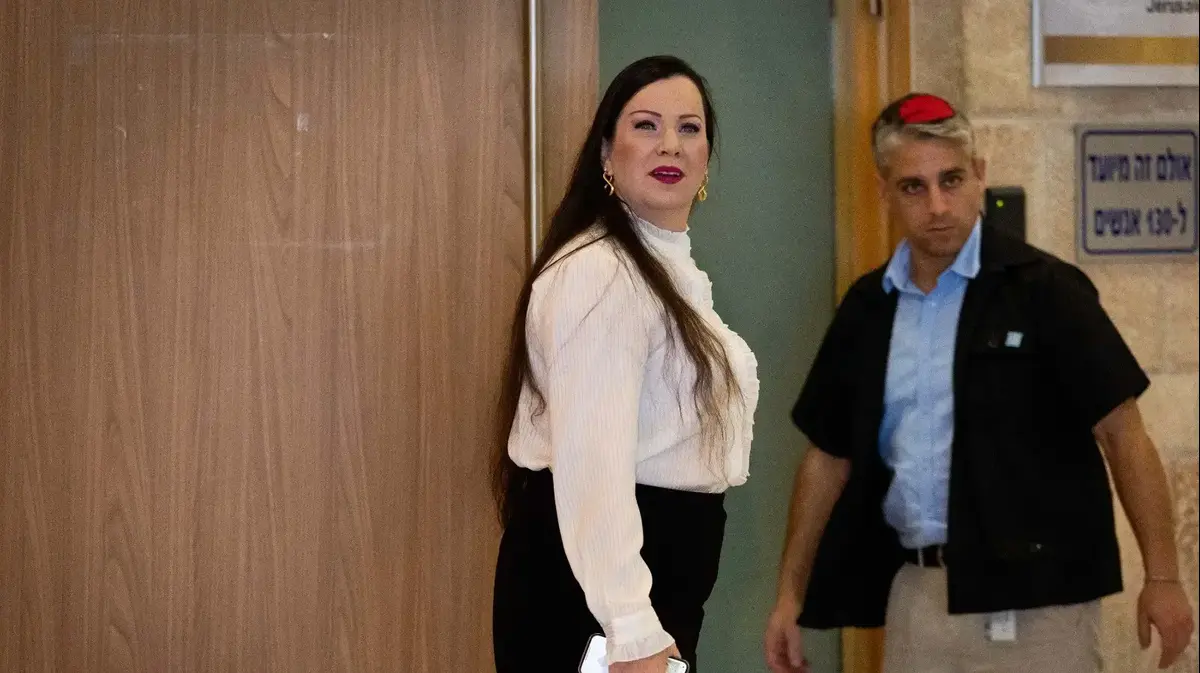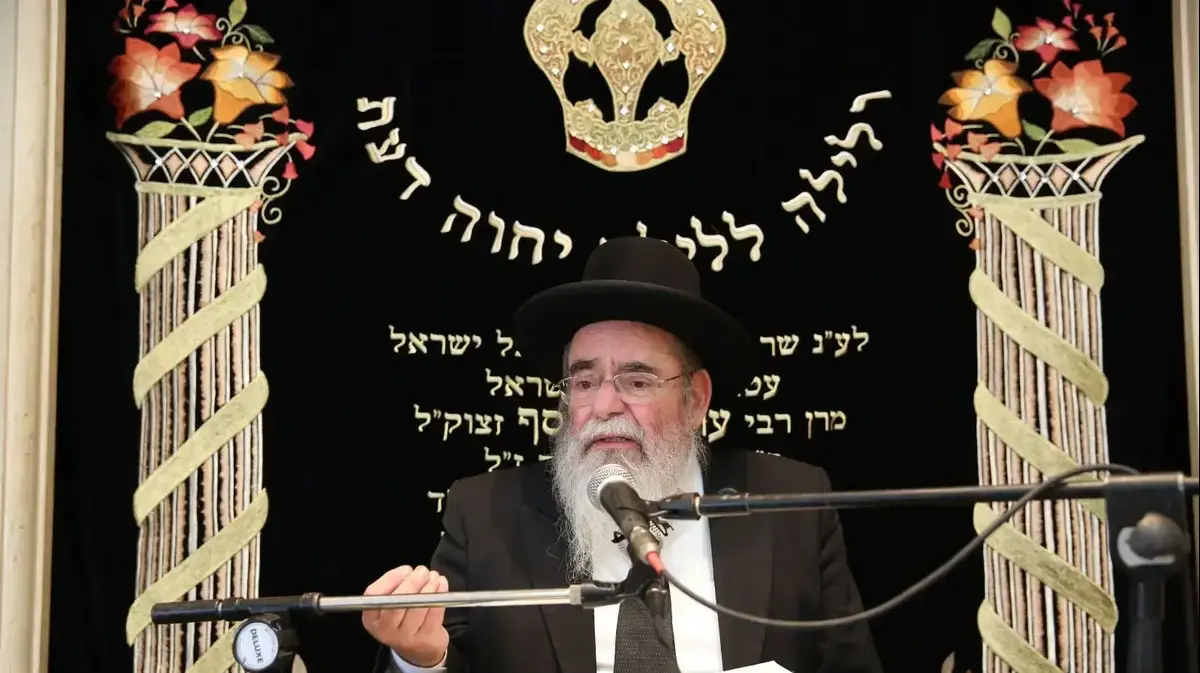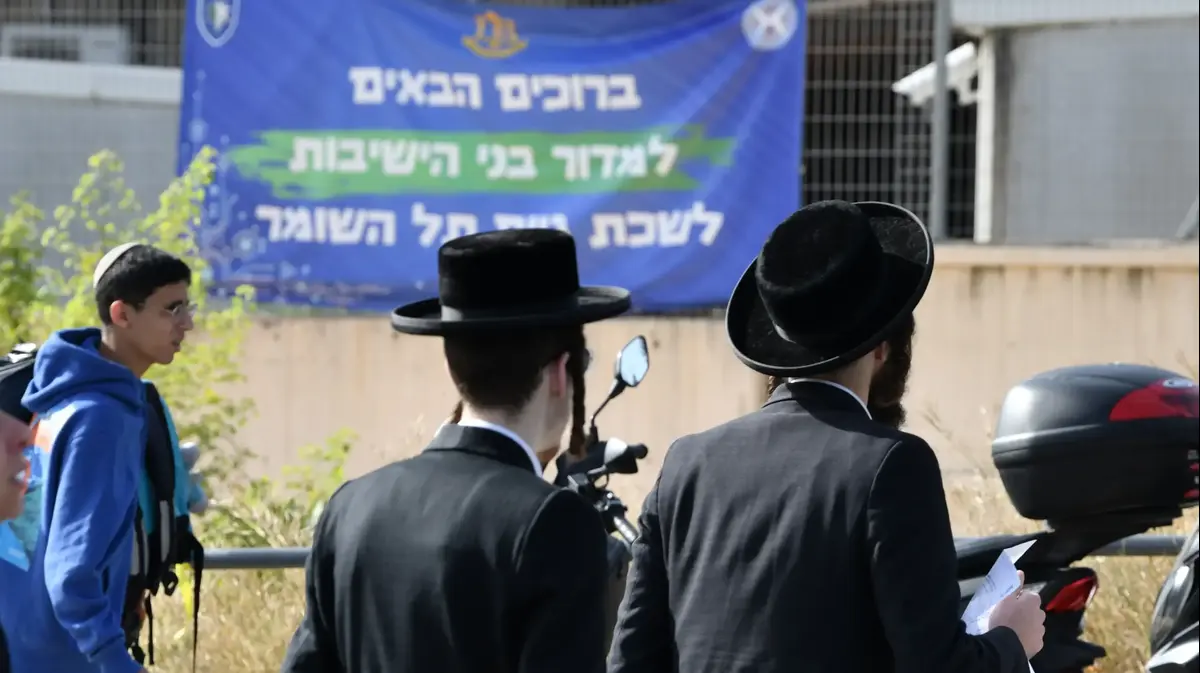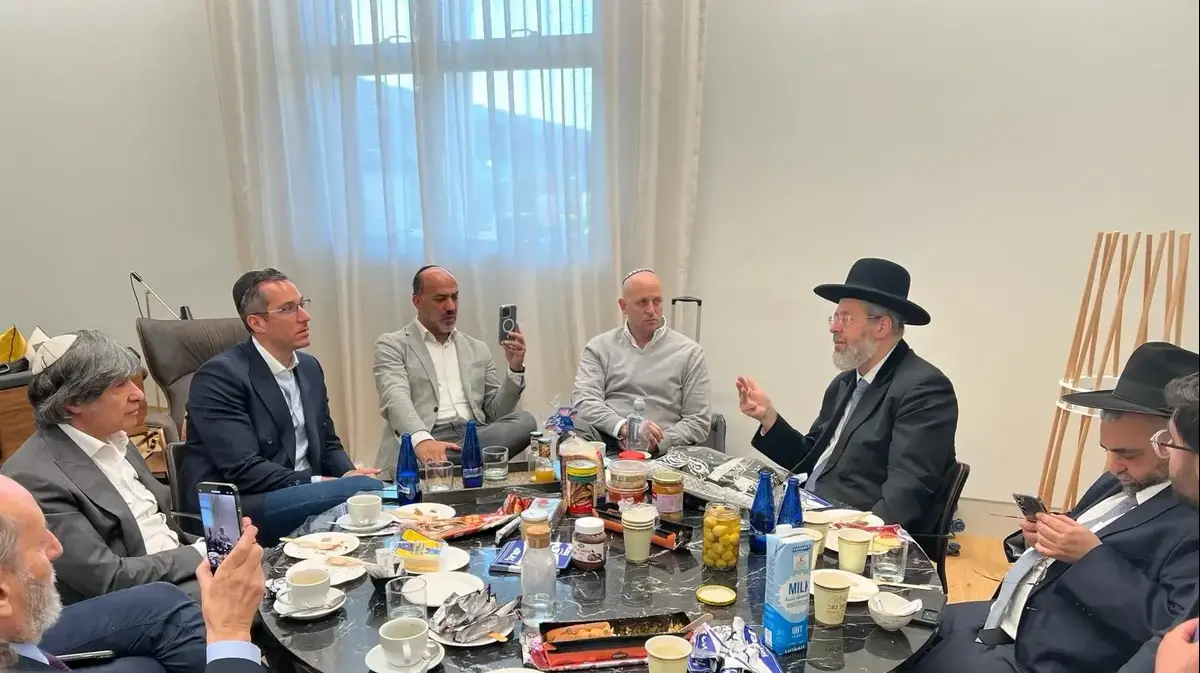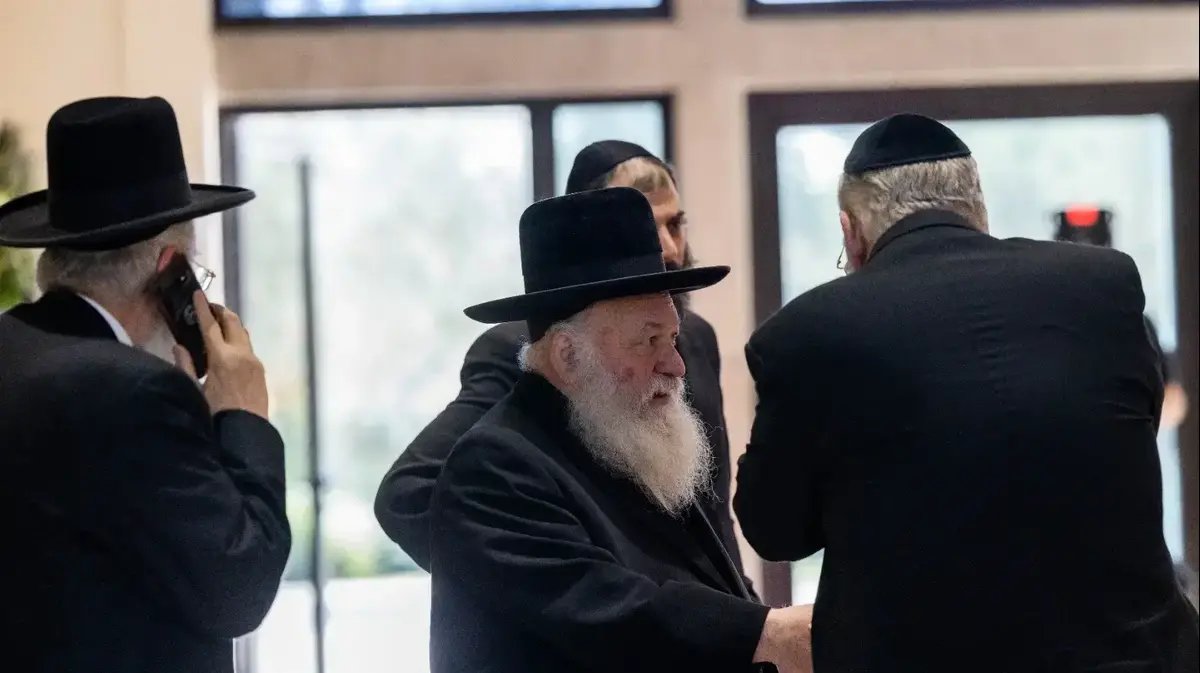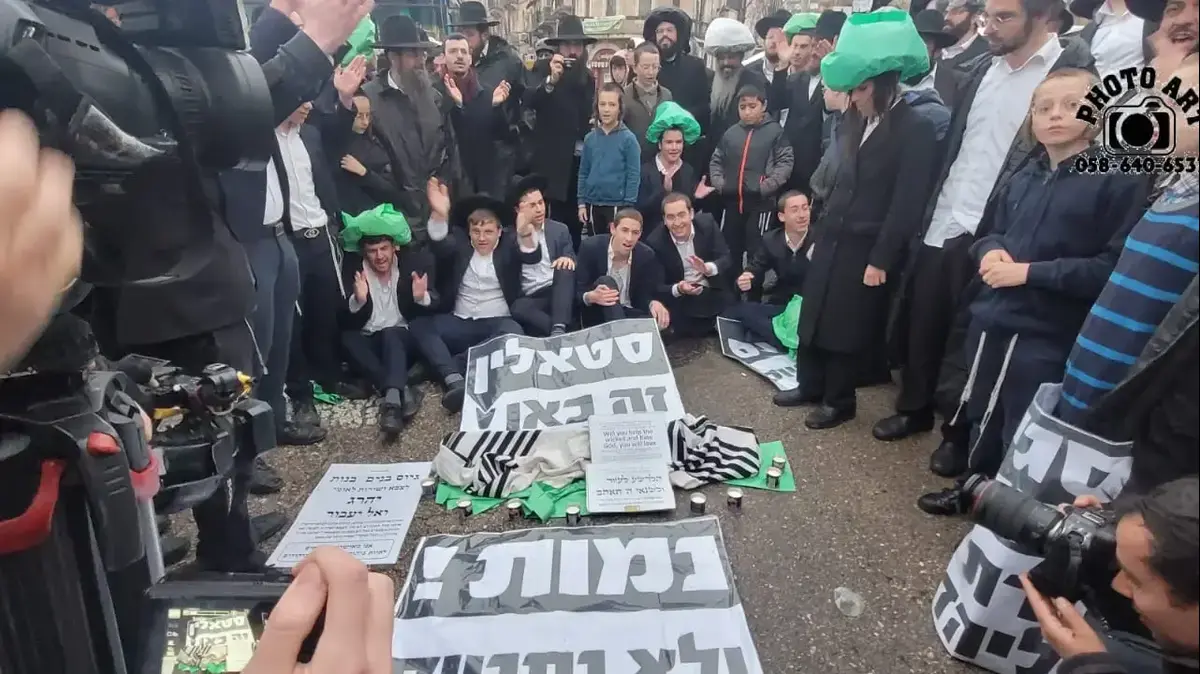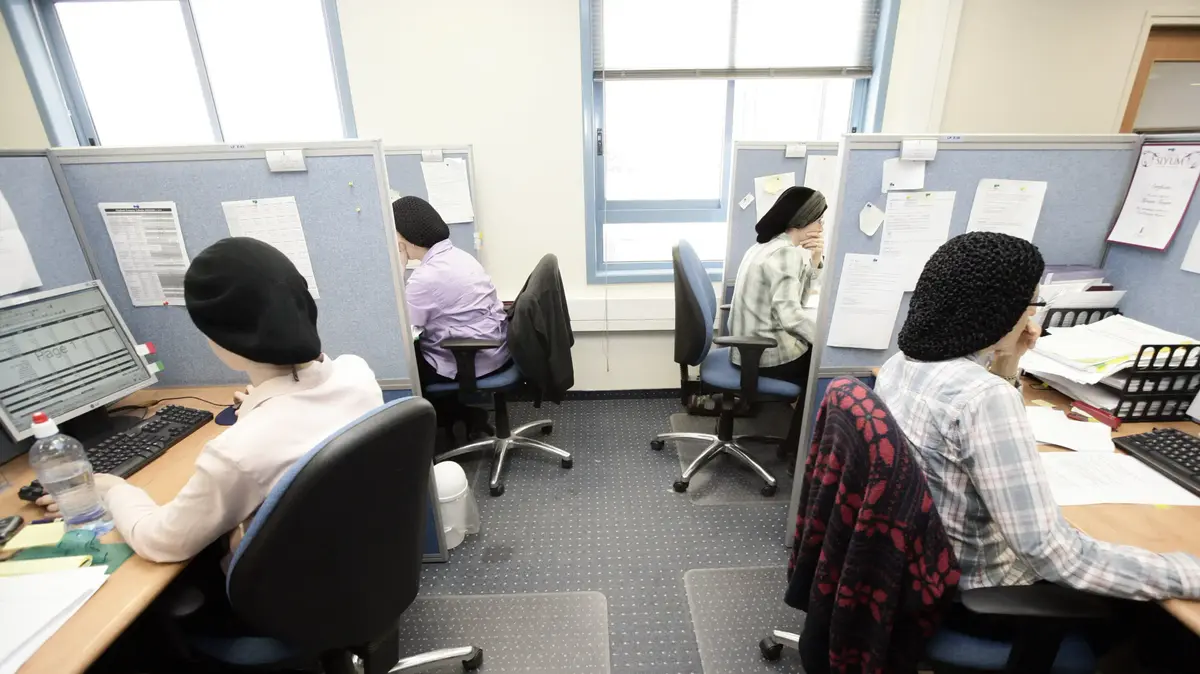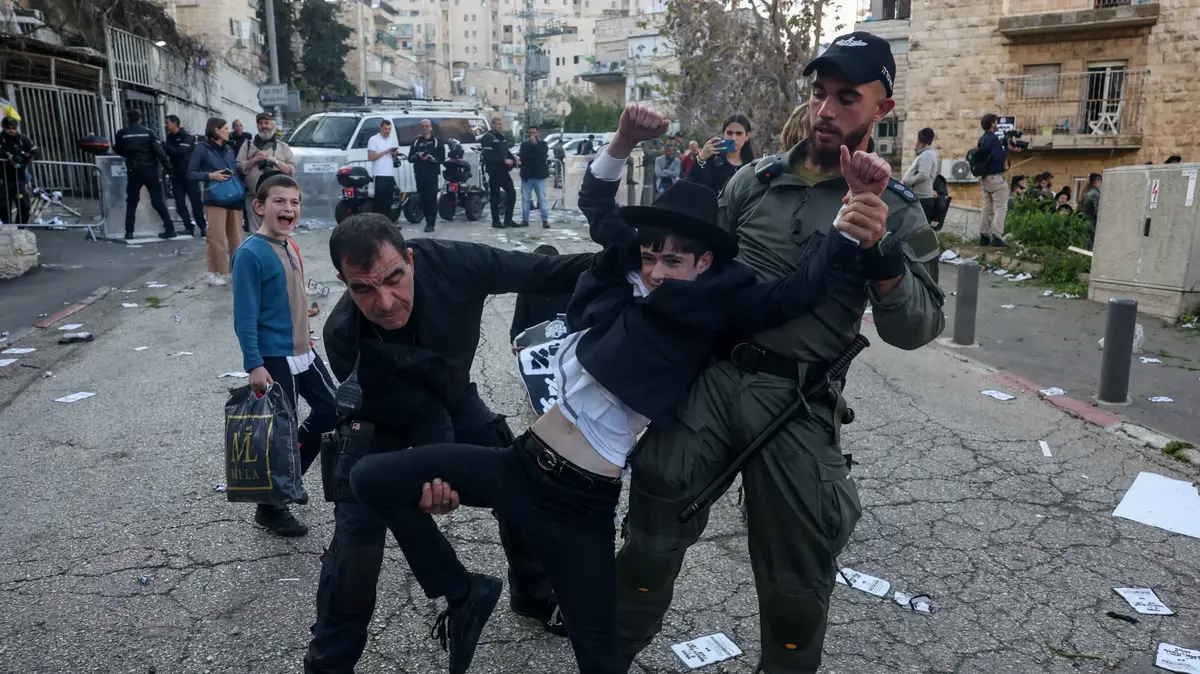What began as a lone rabbi in the United States, has become a real phenomenon, and religious rabbis who previously refused to do so, agree to hold ceremonies for members of the same sex • Is Israel also on the way?
Lina Tapanak, wife Sandy
Photography:
Golnara Smilova
As a teenager, a generous ruler felt a deep sense of sadness at his big brother's wedding.
Realizing that he was attracted to men, Schorer thought he would have no way of building his life in the modern Orthodox community, where he was repeatedly told that there was no place for gays in it.
"I remember mine realized there would never be such an event," he recalls of the wedding.
"And it was very difficult for me."
But earlier this year, Schorer stood with the chosen one of his heart, Ariel Meiri, under a canopy in a ceremony that looked no different at all from the weddings of his brothers and sisters.
The ceremony was conducted by Rabbi Abram of Lotek, an Orthodox rabbi who heads a Jewish organization working with young freelancers in New York.
It was the first time Melotech had performed a same-sex marriage ceremony.
"If the couple chooses to live a Jewish life, build a Jewish home and raise Jewish children, our traditional rabbinate must take the opportunity, welcome it and work with these families in the most precious moments of their life cycle," Malotek wrote last year announcing his decision to marry a couple Of the same sex.
"If we do not do this, and if we deprive these couples of their legitimate place of affiliation, we run the risk of increasing the sense of alienation and falling into the abyss of religious irrelevance."
Malotek is part of a growing group of Orthodox rabbis who break conventions, and agree to hold marriage ceremonies that until recently were inconceivable in the Orthodox world.
During the investigation into this article, JTA located ten certified Orthodox rabbis who conducted or said they would be open to conducting a religious marriage ceremony for same-sex couples.
Although a small group, this number represents a significant change in the Orthodox community, which boasts of strict compliance with the laws of halakhah, a community where a decade ago it was impossible to find one rabbi who would be willing to marry same-sex couples.
"I think for most Orthodox rabbis, the biblical prohibition, and the halakhic prohibitions that followed, were something unsolvable," said Jonathan Sarna, a professor of American Jewish history at Brandeis University, referring to the prohibition on having a male intercourse. "And I think that's very important, it's a change of attitude."
Judaism cares about people
Among the rabbis who decided to break this convention are also prominent figures in the community such as Rabbi Asher Loftin, former head of the liberal Orthodox rabbinical school Yeshivat Hovevei Torah, who said he would "seriously and positively consider" marrying same-sex couples.
"The Judaism I believe in, the one that I think God has given us, is a Judaism that cares for people, takes care of their needs and gives them meaning, so Jewish law and Jewish tradition need to address this issue," said Loftin, who heads a modern Orthodox synagogue near Detroit.
In addition to Mlotek and Loptin, Rabbis Daniel Atwood, Eli Friedman, Gabe Greenberg, Steve Greenberg, Daniel Landes, Sarah Mulharn, Aharon Potek and Shmuli Yanklovich now also agree to hold marriage ceremonies for LGBT couples.
Some were ordained rabbis at Yeshiva University, the modern Orthodox rabbinical school that recently refused to accept an organization of UAV students. He also ordained Mulhran, who graduated from a rabbinical school that does not belong to one of the recognized streams.
Orthodox Judaism believes in the traditional interpretation of Jewish law, which does not allow, among other things, same-sex marriage or same-sex intercourse.
Attitudes about same-sex marriage, and the acceptance of members of the LGBT community in general, are similar in the conservative ultra-Orthodox Orthodox world, which maintains a strict separation from the secular world.
But in the modern Orthodox community of the United States, where the religious way of life is balanced by the acceptance of the secular world, the process of accepting members of the LGBT community has recently accelerated.
This approach has led some modern Orthodox rabbis to conclude that prohibitions should be re-evaluated, including a passage often quoted from Leviticus, which has traditionally been interpreted as calling male intercourse "abomination."
"I see this prohibition and a series of related prohibitions as part of a tension with other values in the Torah, including the value of life and the value of saving lives. With what we know today about suicide rates among homosexuals, I think it is very relevant," said Rabbi Gabe Greenberg. Who for the first time held a same-sex marriage ceremony.
The number of rabbis ordained as Orthodox rabbis conducting same-sex marriage ceremonies may increase.
About 45 rabbis participated in a series of meetings that began in 2018 with the aim of thinking about what spouses' weddings would look like in an Orthodox environment.
The talks were hosted by Torat Chaim, a progressive Orthodox group led by Yanklovich, who did not hold a same-sex marriage ceremony, but said he was "very open" to it.
"This is an issue that causes a great deal of activity in the Jewish community and the Orthodox community. In the progressive Orthodox world, there is a great willingness to accept it," Yanklovich said.
Although the Orthodox movement lags far behind other Jewish streams - all of which allow same-sex marriage and are more willing to accept queer rabbis - there is now a greater willingness to accept LGBT members at the community level, especially in modern Orthodox synagogues, said Rabbi Zeev Alef , An associate professor of Jewish history at Toro College, who researched American Orthodox Judaism.
Parts of the Orthodox community are ready for the phenomenon
"20 years ago, when someone came out of the closet, a man who wanted to marry a man or a woman who wanted to marry a woman, if they made such a decision they actually also decided to leave Orthodox Judaism. Today, of course they may not become presidents of their synagogue, but they can "Living in peace with their family lifestyle and finding certain Orthodox schools and modern Orthodox communities," Alef said.
Recently, Rabbi Bnei Lau, a prominent Israeli Orthodox rabbi, issued a statement proposing a solution for same-sex couples seeking to build their lives in the religious world.
Although Rabbi Lau did not propose a framework for the wedding ceremony, he said the urge to get married and get public approval for the relationship should not be ignored, and that Judaism does not prohibit gay couples from starting families.
No American Orthodox Jewish group has officially approved same-sex marriages, but Orthodox queer couples receive support from friends and family.
"Is the modern Orthodox community ready for something like this? At our wedding there were 300 people, at least two-thirds of whom were from the Orthodox communities in Cleveland, New York and Los Angeles. We know not everyone is as lucky as we are, but no doubt parts of the Orthodox community are ready for it," he said. Jerry Borison, who married his partner earlier this year in an Orthodox ceremony conducted by Rabbi Eli Friedman.
One of the obstacles that same-sex couples seeking to hold an Orthodox wedding ceremony will have to deal with, is how to hold a ceremony originally created for heterosexual couples.
In a traditional Jewish wedding, two witnesses sign the ketubah, the couple's marriage contract, outlining the husband's responsibility to the wife.
Then, at the engagement ceremony, or consecration, the groom "purchases" the bride by giving her a ring and reading the ketubah.
During the marriage ceremony, seven blessings are said - including two that use language that specifically refers to the bride and groom.
Some same-sex couples choose to hold the ceremony as close as possible to the traditional pattern.
Borison and his partner, Michael Greenberg, wanted to maintain as much closeness to tradition as possible, and changed only the text in Hebrew so that it would refer to both grooms instead of the bride and groom.
They also used two inscriptions - instead of one - because the text in the inscription is one-sided, and speaks only of the husband's responsibility to his wife.
Others rely on alternative models, as they feel that the liturgy of a traditional wedding does not apply to same-sex couples.
"We wanted a traditional wedding and we also wanted a tribute to our queer identity, and queer culture. We didn't want to do exactly the same things we would do in a gay wedding with just changing body nicknames," Rabbi Daniel Atwood told his partner Yehuda Govent about his 2019 wedding.
To do this, the couple worked with the rabbi who conducted the ceremony, Gabe Greenberg, and drew inspiration from a sample created a few years earlier by Rabbi Steven Greenberg, who came out of the closet after being ordained a rabbi in 1983, and in 2011 became the first certified Orthodox rabbi to perform a marriage ceremony. Of the same sex.
(There is no family connection between the two rabbis.)
The ketubah was replaced by Steve Greenberg in a 'partnership deed' ceremony, a legal agreement recognized by business partnerships.
The idea of using such a partnership for a wedding was first proposed in 1999 by Rachel Adler, a reformist feminist rabbi who felt that Ketubah was characterized by sexist language.
(In recent years, many heterosexual couples have decided to follow in Adler's footsteps and make their marriage ceremonies more egalitarian).
Steven Greenberg creates the document together with the couple to suit their relationship, and the document is read aloud during the ceremony.
Instead of the ordination ceremony, which establishes the monogamy when the husband gives the wife a ring, in the Greenberg ceremony the two spouses swear an oath to be faithful to each other.
Instead of the traditional 'seven blessings', at Greenberg's ceremony, family and friends come and greet the couple with seven blessings of their choice.
Sandy and Lina Tapanak had a shared vision for their wedding that took place in 2018. "We wanted something reminiscent of Orthodox weddings we were at, that had a sense of tradition. We did not want to get involved with Halacha. We did not want to pretend it was something I went, when it was not. It did not feel authentic to us. And we did not want to feel that we were necessarily realizing something new, "said Lina Tapanak.
Mulhran worked with the couple to design a ceremony that used the "double vow" mechanism - each woman promises to be monogamous with the other - instead of the traditional blessing said at the consecration ceremony.
They then held a 'Seven Blessings' ceremony tailored to them.
"Aesthetically, it is like a traditional Jewish wedding," Mulharn said.
The way couples design their ceremonies represents the general tension regarding the change that is taking place in the Orthodox world - can the thinking about tradition be adapted or changed according to the spirit of the time?
"I respect people who do an alternative ceremony, and everyone is entitled to a ceremony that they feel comfortable with, but I see it as a step in the wrong direction because it is separate but identical," said Michael Greenberg, whose marriage ceremony to Borison remains as close as possible to the traditional ceremony.
"It's basically not officially recognizing a gay wedding as a wedding, they say it's something else ... they use the halakhic mechanism of a partnership [partnership deed] to give some kind of halakhic validity or halakhic mechanism to a same-sex marriage, but it's not a Jewish wedding. [Traditional] ".
Friedman, the rabbi who conducted the marriage ceremony, said that the legal Jewish validity of a marriage is only one part of the set of important things in marriage.
"What we are saying is that the ceremony itself, the sense of commitment to each other and to God and the people who were there, are important and meaningful in their own right," Friedman said.
"Even if we were to leave to God the question of what the ultimate halakhic meaning is, we still wanted to do it this way."
Not all progressive Orthodox rabbis agree to hold same-sex marriages, even when they believe that queer Jews should be part of the Orthodox communities.
Alef, a professor at Toro College, says that although there is an increase in the reception of queers in the Orthodox world, weddings may be one step too far.
“It crosses the boundaries of how modern Orthodoxy debates halakhah in modernity,” he said.
"The message it sends outward is the decision to adapt halakhah to modern sensitivities, and modern Orthodoxy really avoids it. It does not allow for such aggressive halakhic decisions."
The community of Rabbi Gabriel Blino, at the Community Synagogue on 6th Street in Downtown New York, welcomes queer members and was a partner in hosting a sabbatical of the Eshel organization, a group of Orthodox Jews for UAVs. However, Blino does not see a way for Orthodox Judaism to offer weddings For same-sex couples.
"I feel I am limited by the mechanisms of Jewish law and I do not have a mechanism by which I can hold such a wedding," he said.
"Therefore, while the secular side within me, and the progressive American side within me, strongly support the legalization of same-sex marriage, I do not hold such weddings in a religious context."
And this is why quite a few queer Jews, who grew up as Orthodox, turn to other streams of Judaism when planning their wedding.
"Many Orthodox Jews find friends who will perform the ceremony, or rabbis from other streams.
There are very few certified Orthodox rabbis who will perform marriage ceremonies - very, very few.
It is true that it is nice if a rabbi does this, but I do not think it is necessary, and people have held these ceremonies for decades without a rabbi, "said Miriam Kabakov, executive director of the Eshel organization.
Kabakov herself held two weddings for same-sex Orthodox couples, and advised other couples.
Few people are willing to deal with this core problem
Others choose to leave Orthodoxy altogether, having come to the conclusion that there is no point in waging a war on creating a place for themselves while other streams have already created this space for them.
The marriage ceremony of Gedaliah Robinson with his partner Caleb that took place this year, a multi-conservative entry.
Although Robinson grew up and was very involved in the Orthodox world - his father is Rabbi Menachem Fenner, the dean of the Yeshiva University Rabbinical School - he was exhausted, he said, by the constant need to fight for acceptance.
"It really drains you. It's like throwing a rope across a ravine to create a bridge, throwing a very heavy rope, very very long distance, and often meeting at the other end a person who is not even willing to reach out," he said.
This struggle also causes progressive Orthodox rabbis to leave the movement.
"There are so few people who are really willing to deal with this basic core problem in the Orthodox world, that I have decided that I personally do not need the same affiliation to this stream to ultimately deal with the most important question for me ... which is how we think God, Halacha and Jewish values want me He who is born gay will live his life, "said Rabbi Aharon Potek, who was ordained a rabbi at the Yeshiva Hovevei Torah, and publicly announced last year that he no longer identified with the Orthodox current.
Potek said he saw colleagues seeking to include UAV members in their communities who had to deal with pressure to "prove their orthodoxy" after critical members of the community accused them of abandoning community values.
"This struggle did not interest me," said Potek, who works at the Sixth & I Synagogue, which does not belong to one of the familiar streams, and is scheduled to hold a same-sex marriage ceremony for the first time next year.
Others feel there is hope for creating more inclusive Orthodox communities.
"There are a number of Orthodox rabbis who today feel confident enough in the healthy halakhic system of Orthodox Judaism that they can address these issues with compassion and deep thought to reach solutions to heartbreaking situations," said Rabbi Daniel Landes.
Landes, the rabbi who ordained Atwood to the rabbinate, the outspoken gay student whom the Yeshiva Hovevei Torah refused to ordain, is himself in the midst of change.
In July he said he was not yet ready to hold a same-sex marriage ceremony.
September has already changed direction.
"I only do weddings for students. I have not yet had the opportunity to have a wedding for members of the same gender, but - if we can agree on the appropriate liturgy - I can see it happening," he said.
"I do not turn my back on my students."
He said he is still in the process of trying to figure out what the ceremony will look like and what the legal ruling will be on the issue.
"Halachic rationale is required, and it is also very possible, because God cannot create a world that degenerates some of its members into a sin from which they can not be extracted," he said.
"How can we get there? I think I have a way."
This kind of thinking allows queer Jews like Shorer to marry and imagine a future in the religious world.
"Our wedding day was spiritually the most uplifting and exciting day I have ever experienced," said Schorer, who with his partner belongs to an Orthodox synagogue. "And I realized that I can live my truth, of who I am, and marry the man I love in a way that suits us. He was Jewish and traditional - it felt right. '

